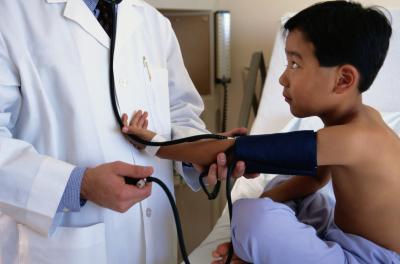You may not look at your child and consider him to be at risk for high blood pressure. After all, people tend to view hypertension as an adult condition. Unfortunately, children are at risk for an elevated blood pressure, and the risks are just as severe for them as they are for adults. Fortunately, only about 3 percent of children have hypertension, according to Kids Health.
What Is High Blood Pressure in Children?
Blood pressure is measured with two numbers, the systolic, or maximum pressure, and the diastolic, or minimum pressure. In adults, a reading of 140 (systolic) over 90 (diastolic) is considered hypertension, while a reading of at least 120 over 80 is considered prehypertension. The numbers are lower for children and depend on the child’s sex, height and age. A child with a blood pressure reading higher than the 95th percentile for her age, gender and height has hypertension. For instance, a 12-year-old boy of average height with a reading of 125 over 85 would have high blood pressure, according to the National Heart, Lung and Blood Institute’s Blood Pressure Table.
Causes
Typically, younger children are more likely to have high blood pressure as a result of another illness, according to the Mayo Clinic. Children with heart disease, kidney problems or genetic conditions tend to have high blood pressure. In some cases, hypertension in babies is caused by immature lung development or a narrowing of the aorta, according to Kids Health. Excess weight in older children is a common cause of hypertension, as are certain medications. Hypertension can also be an inherited condition.
Symptoms, or Lack of Symptoms
Hypertension is often called a silent killer, since most people do not know they have it until they visit a doctor. The same holds true for high blood pressure in children. Most doctors begin to test children’s blood pressure around age 3, according to Kids Health. Severe cases of high blood pressure can lead to symptoms, such as dizziness, blurry vision and vomiting. Since these symptoms are usually signs of an emergency, according to the Mayo Clinic, you should take your child to the doctor immediately.
Treating High Blood Pressure
If your child’s high blood pressure is the result of another condition, it will usually resolve when the other condition is treated. High blood pressure caused by too much weight or lack of activity may be lowered with a change in diet, including consuming less salt and eating more vegetables and fruit, along with more exercise and a weight loss goal. Some children may need to take medications such as a diuretic or beta blocker, though this is usually not the preferred course of action, according to Kids Health.
Risks
High blood pressure in children that does not resolve can lead to severe complications. Some children may experience sleep apnea or breathing problems while sleeping. Hypertension that continues into adulthood puts children at risk for stroke, heart attack or kidney damage later in life. Children with high blood pressure also face more risks if they decide to start smoking or if they already smoke and do not quit.





